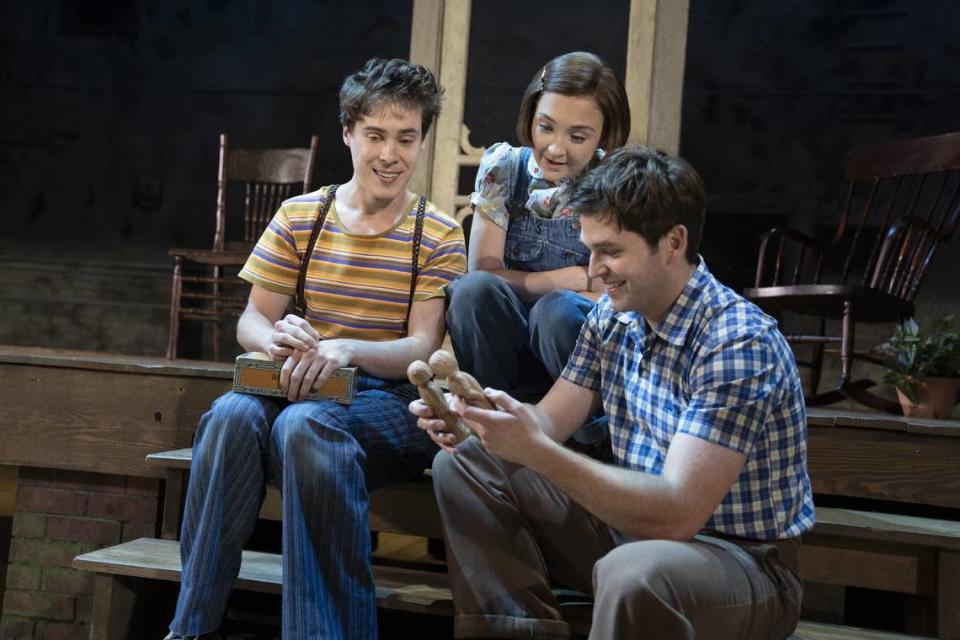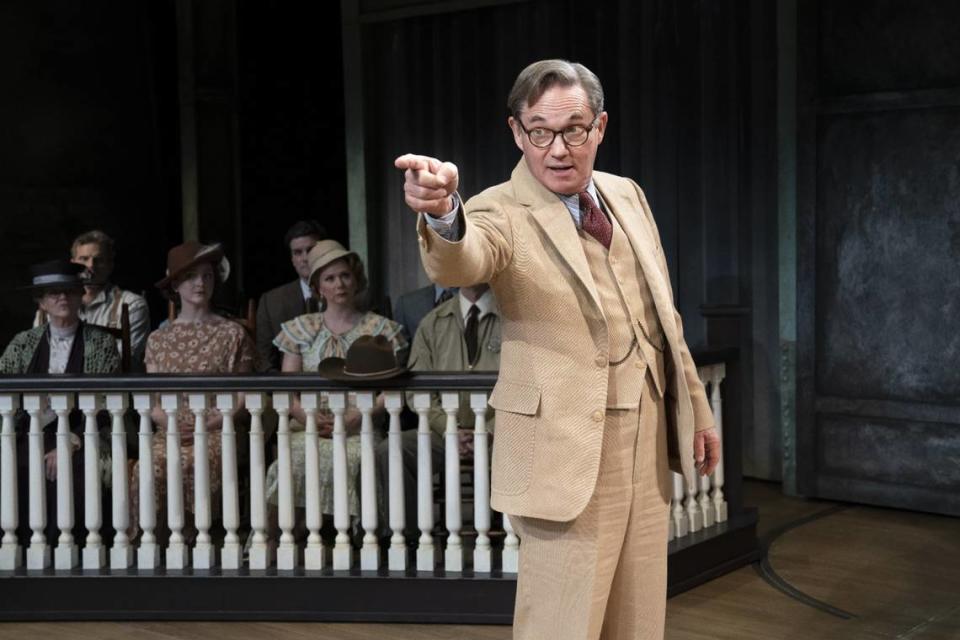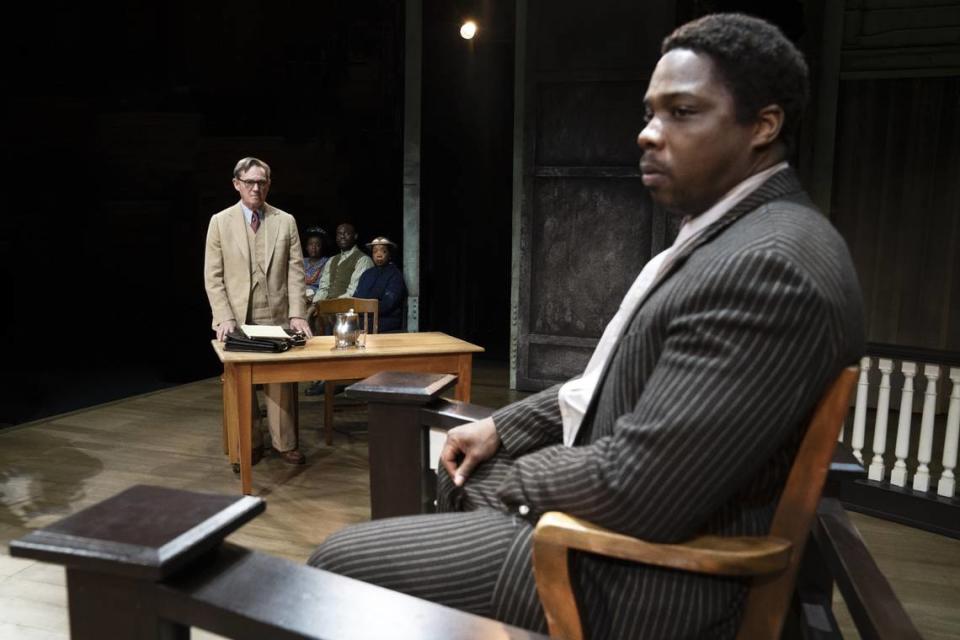How (and why) Aaron Sorkin flipped the script for stage version of ‘To Kill a Mockingbird’
- Oops!Something went wrong.Please try again later.
- Oops!Something went wrong.Please try again later.
- Oops!Something went wrong.Please try again later.
Aaron Sorkin is well-known and well-lauded for his career as a screenwriter, from TV’s “The West Wing” to movie credits including “Moneyball,” “Molly’s Game” and “A Few Good Men,” to name just a few good projects.
He’s an Oscar winner (Best Adapted Screenplay for “The Social Network”) and a five-time Emmy winner (four times for Best Series for “The West Wing” and once for Outstanding Writing for a Drama Series for that show.) He’s also Mr. “Walk-and-Talk,” with inventive, witty, fast-spoken dialogue as his characters, well, walk and talk.
But at heart, Sorkin sees himself as a playwright.
In 2015, he was approached about adapting Harper Lee’s classic novel “To Kill a Mockingbird” for the stage. After a rocky start over rights issues and departures from the book, the show went on to become the highest-grossing American play in Broadway history.
”To Kill a Mockingbird” makes its return to Charlotte on Aug. 1 for a weeklong stint at Belk Theater, with Richard Thomas (a veteran stage presence, and well known from his time on “The Waltons”) as Atticus Finch, and adults playing the child roles of Scout, Jem and Dill.

The play was directed by Broadway vet Bartlett Sher, whom Sorkin recently re-teamed with on the “Camelot” revival that just closed.
Sorkin recently responded by email to questions from The Charlotte Observer about his work on the play.
Normally in such a setting, the Observer lightly edits responses for clarity and brevity. But in this case, we’re good with letting Sorkin be Sorkin.

Q&A with Aaron Sorkin
Q. You’ve said that what you love most is writing plays. Can you describe the attraction?
I’m very lucky that I get to write movies and television series, but I feel most at home in a theater. I grew up loving movies and television as much as anyone else, but with plays I was a student. I still am.
Q. Is there a different approach you take to writing a play than writing a TV or movie script?
There isn’t for me. No matter what I’m writing I tend to end up writing a play.
Q. Congratulations on writing the most profitable play in Broadway history, by the way. Why do you think this story resonates so well with so many people?
Thank you and that’s a good question. I think people come to the play hoping to connect with something from their childhood but end up connecting much more to the world they’re living in today.
Q. Take me through your process of taking this classic novel and turning it into a play. How do you decide what to take out, what to leave in and where to differ from the source material?
My first draft was terrible. I’d swaddled the book in bubble wrap and tried to gently transfer it to a stage. It was like a greatest-hits album played by a tribute band. There were a number of problems but among the biggest was Atticus. A protagonist has to change. A protagonist has to be put through something and change.

But Atticus was the same guy at the end of the story as he was at the beginning. How could that be? How did Harper Lee get away with that in the novel and how did Horton Foote get away with that in the screenplay? Simple. In the book and the movie, Atticus isn’t the protagonist.
Scout is. Scout changes. She loses her innocence. She gets older. And that’s fine, but for the play I needed Atticus to be the primary protagonist. He had to change.
Q. What was the most challenging part of the adaptation?
Falling out of love with the book. I couldn’t try to do a Harper Lee impersonation and I couldn’t pretend I was writing the play in 1959.
Q. You also gave Calpurnia (Atticus’ maid) and Tom Robinson (the Black man accused of sexually assaulting a white woman) more agency than they had in the book or movie, with Calpurnia acting as an antagonist to Atticus, and Tom voicing, “I was guilty as soon as I was accused” — a line that was Scout’s in the book. Why were such changes important to make?
In a play about race relations in the Jim Crow South, I thought the only two significant African American characters should be involved.

Q. If you had free reign, are there any other works that you’d like to adapt for the stage?
Not at the moment but I’ll let you know.
Q. You’ve spoken about how you were active in your high school drama club, community theater and helping acquire rights to shows. Attempts to put on certain plays in high school seem to be the next target in the political social wars. What would you say to people who are eager to change, censor or otherwise cancel shows in schools?
I don’t know what the upside is of banning books and plays from classrooms. If a student finds a certain piece of work troubling, then a classroom is exactly where that discussion belongs.
Q. What are you working on now?
I’m trying to have an idea.
‘To Kill a Mockingbird’
What: The stage adaptation of the classic book by Harper Lee.
When: Aug. 1-6.
Where: Belk Theater, 130 N. Tryon St., Charlotte.
Tickets: Go to blumenthalarts.org/events.
More arts coverage
Want to see more stories like this? Sign up here for our free “Inside Charlotte Arts” newsletter: charlotteobserver.com/newsletters. And you can join our Facebook group, “Inside Charlotte Arts,” by going here: facebook.com/groups/insidecharlottearts.

